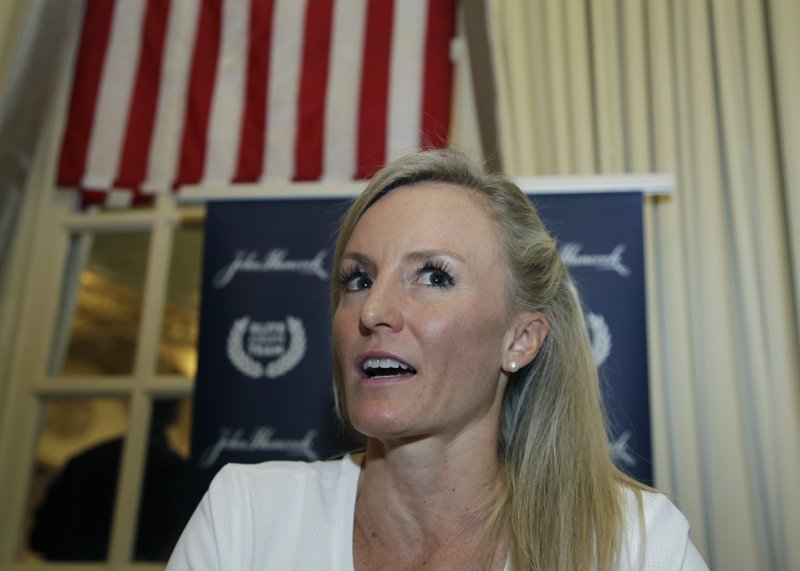
Elite U.S. runner Shalane Flanagan speaks to reporters, Friday, April 13, 2018, in Boston. The 122nd running of the Boston Marathon is scheduled for Monday. (AP Photo/Elise Amendola)
BOSTON — Growing up in nearby Marblehead, Shalane Flanagan watched her parents run the Boston Marathon and thought, “I want to do that, too.”
Jordan Hasay watched Flanagan win in New York last fall, and had much the same idea.
“I looked up to her since I was a little kid,” said Hasay, who finished third in Boston in her marathon debut last year and will return to the course Monday as part of the most competitive pack of U.S. women to run the race in decades.
“It feels weird to be racing her in a marathon. I feel a little intimidated by her with all her credentials,” Hasay said. “All the Americans are an inspiration.”
No U.S. woman has won the Boston Marathon since Lisa Larsen-Weidenbach in 1985, the year before the historic race began offering prize money that lured the top international professionals to town. Meb Keflezighi’s cathartic victory in 2014, one year after the bombings that killed three spectators and wounded hundreds more, ended a men’s drought that had stretched to 1983.
In that time, Kenyans and Ethiopians dominated the podium and often shut the Americans out of the top 10 entirely.
But the locals are catching up.
Last year, Americans took two of the top four women’s spots and six of the top 10 for men — the first time that’s happened in the professional era. Hasay was third and Desi Linden was fourth, her fourth top 10 finish in the race in as many tries; Flanagan was injured and did not run, but she’s back in the field this year for what she says will be her final attempt to win her hometown race.
“Everything’s ripe for the taking, and I think we’re going to,” said Linden, a two-time Olympian who finished second by 2 seconds in 2011.
“The exciting thing is: No one’s saying ‘I want to be top American.’ It’s: ’I want to break the tape,’” she said. “That’s not good enough anymore. It’s a whole new ballgame.”
Defending champions Geoffrey Kirui and Edna Kiplagat, both Kenyan, will lead a field of more than 30,000 runners on the 26.2-mile trek from Hopkinton to Copley Square in the 122nd running of the world’s oldest and most prestigious annual marathon.
The top American men include Olympic bronze medalist Galen Rupp, along with Shadrack Biwott, and Abdi Abdirahman, who finished second, fourth and fifth in 2017. But it’s the women who give the Boston crowd the best chance to hear “The Star-Spangled Banner” wafting over Boylston Street.
Joining Flanagan, Linden and Hasay are Molly Huddle, who finished third in New York in 2016, and Serena Burla, who was fourth in Osaka last year.
“In the past, sometimes all the hope is placed on one person, so it’s kind of nice having the excitement around four real contenders here,” Flanagan said. “It increases our chances of getting on the podium.”
The daughter of distance runners — her mother was the first woman to break 2 hours, 50 minutes in the marathon — Flanagan made it a mission to win in Boston the year after the attacks at the finish line; she finished fifth. She was ninth in 2015 before skipping the next year to rest for the Rio Olympics and missing last year with a back injury.
Then, last fall, she won the NYC Marathon to end a 40-year American drought there.
Now, she said, she can return to her hometown streets without the pressure she once put on herself for a legacy-defining victory.
“It’s more of a personal thing, Boston to me,” Flanagan said. “That’s something I’ve had to work on, knowing that’s part of my psychology that I tend to just want this race so badly, I almost have to pretend that I don’t want to win it in order to do well.
“This is home, and these are the people that I want to make the most proud,” she said. “I want to make them proud that I’m from here, so I have to keep that in check at all times.”
Also relieving the pressure is the knowledge that American hopes aren’t all riding on her: If she can’t end the drought in Boston, maybe her New York victory can inspire the woman who does.
“Molly’s beaten me. Des has beaten me. What opened the eyes for the other American women was like, ‘If Shalane can do it, why can’t I do it?’” she said.
“It’s nice knowing that if I don’t do it, I just have a really great feeling that one of us will,” Flanagan said. “And that’s a great thing.”

